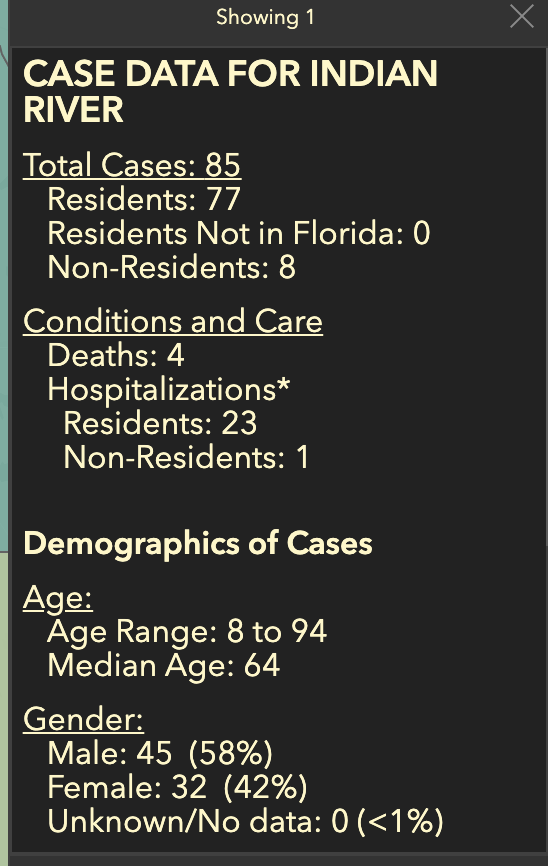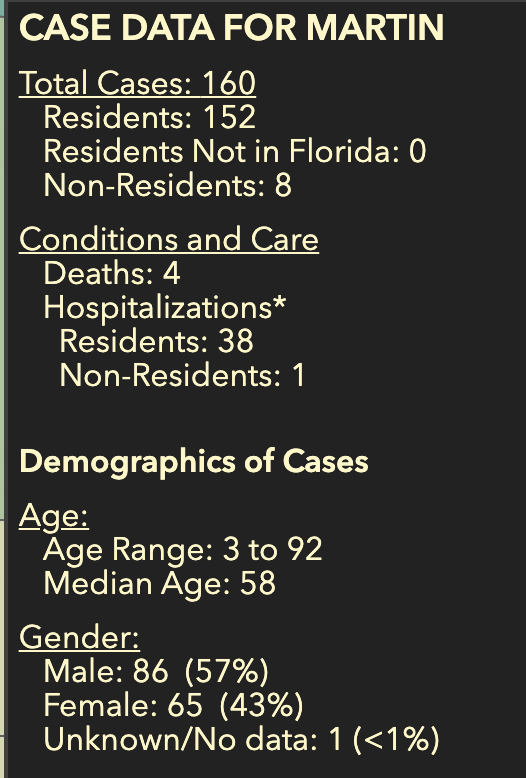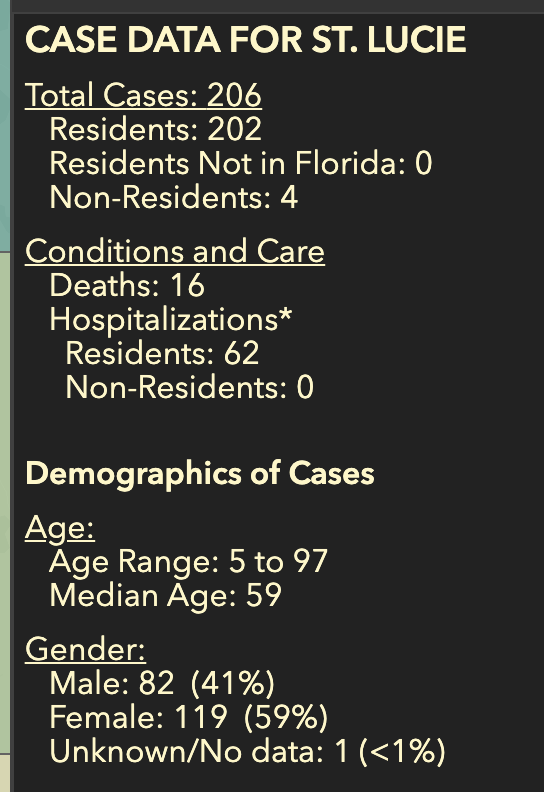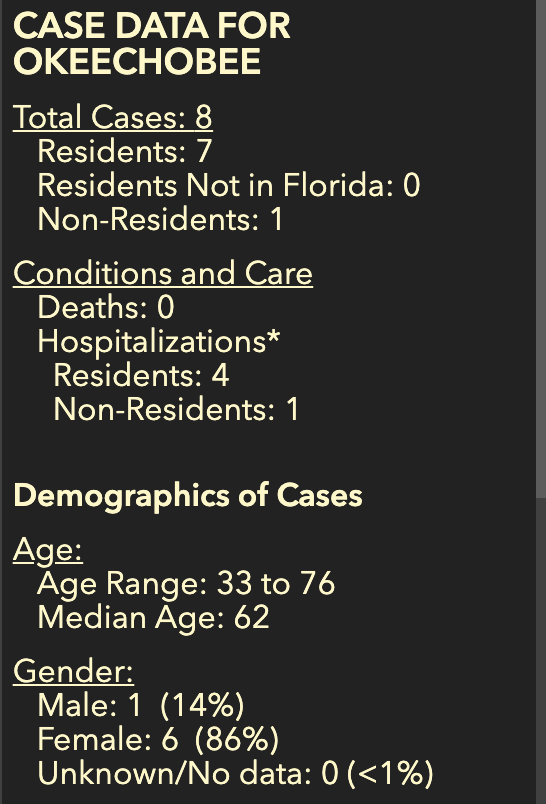TreasureCoast Covid 19 update April 22 2020
Florida’s coronavirus death toll is at 867 after another 44 deaths were reported yesterday. The Department of Health says the number of cases statewide is approaching 28-thousand. More than half of the cases are still located in Miami-Dade and Broward counties. Governor Ron DeSantis is emphasizing Florida’s low positive coronavirus test rate.
———————————
The Florida Division of Emergency Management (FDEM), the Florida Department of Education (DOE), Florida College System (FCS), State University System (SUS), and private institutions across the state announced more than 130 ventilators have been donated to local hospitals, community medical centers and other facilities. The ventilators typically used in medical training programs will help ease any potential shortages caused by COVID-19. The colleges and universities are working with FDEM to transport and donate an additional 40 ventilators.
“One thing we know about this virus is that ventilators can save lives. I applaud these colleges for stepping up today to support our response,” said FDEM Director Jared Moskowitz. “We will continue to use every resource, chase every lead, talk to every potential vendor and leave nothing on the table as we respond to this unprecedented event. As we look ahead at the coming days and weeks, we will continue to run our logistics operations 24/7 to keep Floridians safe.”
Florida colleges, universities, and private institutions donating ventilators include:
- Broward College has committed to donating 5 ventilators.
- Daytona State College has donated 5 ventilators to Halifax Health Medical Center and 1 ventilator to AdventHealth.
- Eastern Florida State College has committed to donating 6 ventilators.
- Florida Southwestern State College has donated 3 ventilators to Lee Community Health.
- Florida State College at Jacksonville has committed to donating 2 ventilators.
- Florida International University has donated 28 ventilators.
- Gulf Coast State College has donated 4 ventilators to HCA Gulf Coast Regional Medical Center and Ascension Sacred Heart Hospital Bay.
- Hillsborough Community College has donated 21 ventilators to Lakeland Regional Health, St. Joseph’s Hospital, and AdventHealth.
- Indian River State College has donated 5 ventilators to Cleveland Clinic Indian River and Martin County and HCA hospitals, St. Lucie Medical Center and Raulerson Hospital.
- Miami Dade College has donated 17 ventilators to Jackson Memorial Hospital.
- NOVA Southeastern University has donated 14 ventilators to Wellington Regional Medical Center.
- Palm Beach State College has committed to donating 6 ventilators.
- Pasco-Hernando State College has committed to donating 1 ventilator.
- Pensacola State College has committed to donating 1 ventilator.
- Polk State College has donated 2 ventilators to Winter Haven Hospital Baycare.
- Sante Fe College has committed to donating 11 ventilators.
- Seminole State College has donated 12 ventilators to Orlando Health and Central Florida Regional Hospital.
- Johns River State College has donated 14 ventilators to St. Vincent’s Medical Center Clay County and Baptist Clay Medical and committed to donating an additional ventilator.
- Petersburg College has donated 7 ventilators to BayCare, Bayfront and Sarasota Hospitals and committed to donating 4 additional ventilators.
- Tallahassee Community College has donated 6 ventilators to Tallahassee Memorial HealthCare.
- Valencia College has donated 3 ventilators to Orlando Health.
- American College for Medical Careers have committed to donating 3 ventilators.
- International College of Health Science has committed to donating 1 ventilator.
- Urgent Response Training Institute has committed to donating 1 ventilator.
In addition to ventilators, Florida colleges, universities, and private institutions are also donating personal protective equipment (PPE) to help local nurses, doctors and medical facilities as they care for patients. Donated PPE includes tens of thousands of boxes of gloves, masks – including N95 masks – gowns, caps, shoe slippers and other PPE supplies.

TreasureCoast Covid 19 update April 22 2020

TreasureCoast Covid 19 update April 22 2020

TreasureCoast Covid 19 update April 22 2020

TreasureCoast Covid 19 update April 22 2020
Florida colleges and professors from across the state are also using their expertise and specializations to help flatten the curve during the COVID-19 crisis. Gulf Coast State College’s Advanced Technology Center is using high-speed carbon fiber cutting equipment to create more than 1,000 mask kits, and an architecture adjunct professor from St. Petersburg College is designing reusable protective masks using a 3-D printer to rapidly get them to local health care workers.
For up-to-date information on COVID-19, visit FDEM’s emergency response page at www.floridadisaster.org/COVID19.
—————–
The state’s low test rate has increased the availability of ICU beds, which has been a point of emphasis in protecting the health care system from getting overwhelmed. This shows a flattening of the curve and DeSantis is applauding residents for doing their part.
——————————————
The State of Florida says 26-percent of the unemployment claims it has received have now been processed. The governor continues to be dogged by questions about the state’s woefully slow unemployment compensation system. But Ron DeSantis says progress has been made.
14-percent who have filed claims have now received a check–up from 6-percent on Sunday.
————————————
As businesses around the state begin to re-open, communication with workers is crucial. Publix CEO Todd Jones told the Executive Committee of the Re-Open Florida Task Force that employees need to be kept in the loop.
Jones says adaptability and flexibility will be watchwords for Florida companies because business conditions are sure to change at a rapid pace moving forward.
————————————
Those looking to get out of the house have new options on the Space Coast. The cities of Satellite Beach and Cocoa Beach announced yesterday the beaches are now open for sunbathing, but groups are limited to five people and beach parking remains closed.
—————————————
COVID-19 testing has ramped up in recent days in underserved communities.
Over a three day time frame, more than 500 people have been given free tests at Dreamland Park in Fort Pierce.
The drive-thru effort was spearheaded by City Commissioner Reggie Sessions, Allied Health and M Care Health Center.
Chavoita LeSane with Allied Health said, “It’s no secret everybody knows the urban community has been hit very aggressively by this virus and from what we saw, no one was trying to give people the opportunity to be tested in this area.”
George Collins, president of NAACP St. Lucie County said, “People are really sick. You can see it when they drive in here. It should have been done earlier.”
Those tested will get their results back in 48-72 hours.
—————————
A Central Florida man, who was battling the coronavirus and received a plasma donation from a Stuart resident, is now back at home. James Crocker of Stuart and Kevin Rathel of Orlando were strangers just a week ago, and are now meeting for the first time. Doctors and nurses cheered Monday night when Rathel was wheeled out of Orlando Regional Medical Center. The good vibes continued as the couple returned home as neighbors held signs and offered words of encouragement. On April 4, Rathel was put in a medically-induced coma. Crocker had recovered from his own battle with COVID-19. Four days later, Crocker, who shared a mutual friend with Rathel, donated his convalescent plasma, which help patients fighting COVID-19. The FDA recently approved the plasma donation procedure only for emergency use on a case-by-case basis.
———————————
Senior living facilities need more help protecting their residents from contracting and spreading COVID-19, according to leadership at YourLife Senior Living.
Rick Olson, who is part of the ownership of YourLife Senior Living, is pressing state leaders and AHCA to help supply senior living facilities with COVID-19 tests. He also wants the state to implement mandatory testing policies.
Olson said YourLife has voluntarily implemented mandatory COVID-19 testing at its six statewide locations, including the facilities in Stuart and Palm Beach Gardens.
New residents are not allowed to move in until they have a negative COVID-19 test. As a result, he says none of their residents or workers have contracted the virus.
They have also implemented strict policies, such as limiting visitation and asking residents not to leave the property.
However, there are some unavoidable circumstances when residents do need to leave the property. If someone gets hurt or sick, they may need to go to a hospital. From there, they might also be taken to a skilled nursing home or rehabilitation center.
“That’s where the problem arises,” Olson says.
“For us, it started becoming an issue a week, week and a half ago,” Olson said.
He explained that a couple of residents recently had to stay in a rehabilitation facility. Once they recovered, he asked that facility to test the residents for COVID-19 before they were discharged and sent back to YourLife.
“They were not prepared or set up to do the testing. We offered to do the testing ourselves. We were told we weren’t permitted to come into the facility to do the test,” Olson said.
He had to get the state involved to get access inside the facility to conduct his own 5-hour test.
Otherwise, the only other option was to send the residents to a loved one’s home to wait for test results before being allowed back inside YourLife.
Even if only for a few hours, that’s another risk for exposure and a large burden on loved ones, Olson explained.
“To take that person home, you have to have your bed set up. You have to have a dedicated room for that person to sleep…Whatever medical conditions they have, you have to have all the supplies for that person,” Olson said.
That is why Olson is pushing to have the state help supply tests to all facilities that care for seniors and mandatory testing policies.
———————————————
Florida farmers are hoping the state’s new hemp program will help them rebound from a virus-sullen growing season.
Lawmakers signed off of the growing and sale of hemp last year. Since then, farmers have been waiting for the completion of rulemaking and federal approval for months. They received it late last week. Florida is now slated to start accepting applications for industrial hemp growing licenses Monday.
The new opportunity could be a reprieve for the state’s second-largest industry, as agriculture continues to reel from a devastating COVID-19 blow.
Agriculture Commissioner Nikki Fired estimates crop losses across the state through mid-April may exceed $522.5 million. The virus, she says, has destroyed demand for fresh produce among bulk buyers as restaurants, processors and schools are shuttered.
Those interested in applying for a hemp license can find more information log on to https://www.fdacs.gov
————————————
Dr. Robert Redfield, the director of the CDC, told the Washington Post that a possible resurgence of the coronavirus timed with the annual rise of the flu could result in an even worse peak at the end of the year.
“There’s a possibility that the assault of the virus on our nation next winter will actually be even more difficult than the one we just went through,” Dr. Redfield told the Washington Post. “And when I’ve said this to others, they kind of put their head back, they don’t understand what I mean.”
With the first wave of coronavirus cases peaking in April, the virus hit after flu cases began to die down. This allowed many hospitals to remain below capacity to handle the influx of coronavirus patients. The same luxury might not be true if the next wave of the virus coincides with the spread of the flu.
Dr. Deborah Birx, who is coordinating the White House’s response to the virus, wouldn’t go as far to say a second wave of the virus would be worse than the current wave.“I don’t know if it will be worse. I think this has been pretty bad,” Dr. Birx said. “When you see what has happened in New York, that was very bad. I believe that we’ll have early warning signals both from our surveillance that we have been talking about, in the vulnerable populations.”
Dr. Birx said that a potential second wave of the virus is why the United States is continuing building ventilators even though there are enough ventilators to handle the current surge after much wrangling between state health officials and the White House.
Although the current wave of coronavirus has killed more than 44,000 Americans, there is unease that the virus could be a repeat of the 1918 flu pandemic, which saw a second wave that was much deadlier than the first.
While testing and hospital capacity is expected to increase in the coming months, two important factors remain unknown: When will a vaccine be ready and when will there be an effective treatment?
Until then, monitoring hot spots and contact tracing will become a key over the next few months to keep the spread of the virus minimal as Americans return to work.
“So we need to have testing in place to be able to separate and ensure those patients receive the best treatment,” Dr. Birx said. “We’re also hoping by that time that we have additional treatment options for people with COVID-19 so that there will be additional treatment available in the fall.”
———————————
The British government is providing funding for two clinical trials of potential vaccines for the new coronavirus, one of which will begin trials on Thursday.
Health Secretary Matt Hancock said at the government’s daily press briefing that the U.K. is at the “forefront of the global effort” to find a vaccine and will provide financial assistance to the “promising projects” being conducted at Oxford University and Imperial College London. The project at Imperial will receive 22.5 million pounds ($28 million) to support its phase-two clinical trials, while Oxford’s will be trialed on people beginning Thursday and will be granted 20 million pounds ($24.5 million).
Hancock also said that the government will invest in manufacturing capacity in the event either, or both, vaccines work.
However, he cautioned about the prospects of success, saying the process of vaccine development is one of “trial and error and trial again.”
——————————————
Congress has reached a tentative agreement with President Donald Trump on a nearly $500 billion coronavirus relief bill.
The US Senate voted in favor of the bill on Tuesday with a small group of senators pushing the bill through in whats known as a “pro forma session.” Sen. Rand Paul spoke up to say he objected to the bill being voted on without the full Senate, but stopped short of forcing the entire Senate to return to Washington.
The bill now moves to the House.The measure would replenish a small business rescue program, provide hospitals with another $75 billion, and implement a nationwide virus testing program to facilitate reopening the economy.
Trump has announced his support, saying he’ll sign the bill if passes both chambers.
Most of the funding, more than $300 billion, would go to boost a small-business payroll loan program that ran out of money last week.





